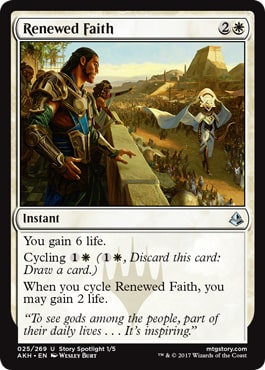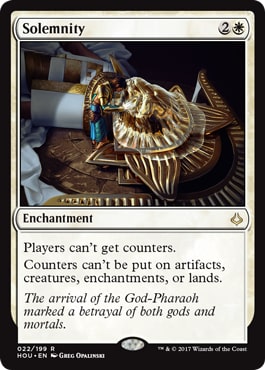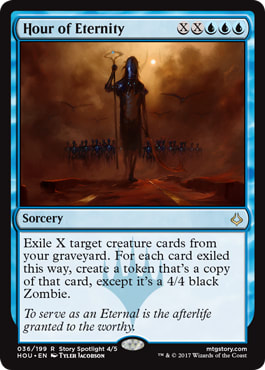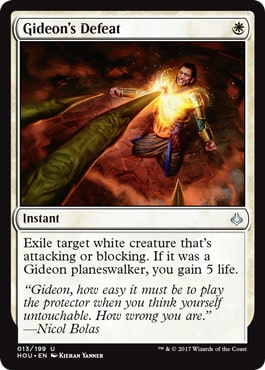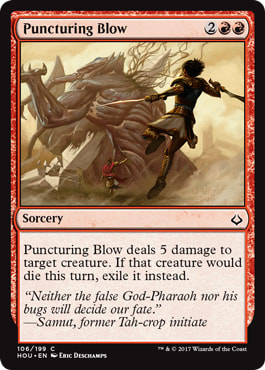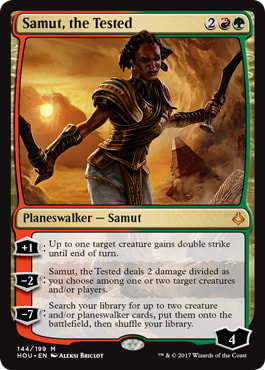Amonkhet's story is about shattered faith and dashed hope. Amonkhet's story is also about affirmed faith and hope snatched from the jaws of defeat. The two things aren't really contradictory, though they might seem that way at first blush. Certainly I've seen folks express the idea that in what, for many of us, are stressful times, a story that was solely an affirmation of hope is what we need, or what "we" "need." According to this view, the overall bleakness of Amonkhet is unacceptable in our present cultural and political environment.
This isn't unique to Magic: The Gathering's storyline fandom. Fandom discourse generally seems to have taken a turn toward the escapist, demanding positive and uplifting narratives. Leaving aside the fairness of this demand — should a reader's demand for positive emotion supersede an author's need to express a negative experience? — I can't help but find myself tripping over the assumption that the natural, necessary response to negative circumstances is to seek out upbeat, cheery art. I mean, the first album I bought with my own money was Pink Floyd's The Wall and I'm listening to melodic death metal while I type out this article, so it's kind of hard for me to relate to this presumption.
It's also somewhat difficult for me to relate to the idea that Amonkhet's relatively critical stance on faith is a bad thing. As a queer person with deeply weird Special Interests who grew up in rural Pennsylvania, I have a history of butting heads with the faithful. Faith to me is my girlfriend telling me tearfully that I needed to come to Christ so I could avoid Hell. (Which she had seen. In visions.) If Amonkhet's storyline is skeptical of faith, by way of Gideon's character arc and the overarching narrative of Nicol Bolas setting up a religion around himself, that's, if anything, rather satisfying for me.
But, fine, I don't expect my personal experiences to sway people really committed to reading Amonkhet as an edgy grimdark creative failure. Is being edgy and grimdark really such a bad thing, though? Isn't there something to be said for a story that unflinchingly looks at how a culture and belief system can go rancid and self-destructive?
Core to Amonkhet's story is the possibility that apparently benevolent systems are vectors for suffering and atrocity. It's a topic touched upon in Kaladesh, of course, though Kaladesh presented systems that were, on the whole, reformable. Amonkhet, on the other hand, is fundamentally broken, and the Hour of Revelation, aptly named, reveals the basically malevolent nature of Amonkhet's whole social system.
This revelation, of course, is incomplete, and some who experience the revelation never come to understand what they're seeing. This is why the first vignette of "Hour of Eternity" is so important, even as it is sickening. "Now was faith justified." It's a grim way to begin a series of stories about a wholesale slaughter, but it makes a certain sense. For the main character of this first vignette, Nylah, all of the teachings of Amonkhet's society are brought into a new clarity, one that carries with it the promise only of oblivion, the acceptance of death. Faith and despair are inextricably tied together. The magnitude of the lie of Nicol Bolas is so vast that, between tearing down her whole understanding of the world and allowing herself to be torn apart by the blades of the Eternals, Nylah's only option is death.
This is a story worth telling, because all too often in our own reality people accept their own destruction or the destruction of others rather than accepting fundamental faults in their social systems. Personally, I expend much energy expressing to people the fact that, yes, oppression of queer people is real, and moreover it is all too frequently systemic, the product of the way society is ordered. Bluntly, I do not pass — if I am dressed a certain way in public, I am read immediately as gender non conforming. This makes navigating certain spaces intrinsically dangerous to me, even in a largely progressive city, because things like bathrooms are frequently set up to accommodate a gender binary that I do not fit easily into, making me vulnerable to assault no matter which of two bad options I select. These are problems that many people seem not just unaware of but uninterested in learning about. I could run down the street screaming that the way society is ordered is fundamentally deranged and deadly and I would be dragged away just as Samut is.
More broadly, how many people still believe, in the wake of a three decade disinformation campaign, that Global Warming simply isn't happening? This is certainly an existential threat on par with the disintegration of the Hekma, the bubble that allows human life to persist eaten away. Yet, how many people will look upon the wildfires burning down whole provinces in Canada, or the waters rising to drown our coastal cities, how many of them will stare out their door at onrushing disaster and say, "Now is faith justified"? This self-annihilating need to pretend that "I'm not here/this isn't happening" will be relevant to fiction as long as humans persist to recite it . . . which may not, admittedly, be for too much longer.
Amonkhet, from this perspective, is a dark cautionary tale about refusing to question the world around you, or see the cost of your beliefs. This lines up rather perfectly with Gideon's overall story arc. As I've described before, his arc is more like a circle worn in the ground, continually following a path where he aligns himself with some dodgy higher power only to become disillusioned with them when their authoritarianism becomes impossible to ignore. When Gideon's hopes are dashed so completely on Amonkhet by the nightmare of the Hours, Gideon falls back on his strongest faith: faith in his own indestructibility.
This does not end well for the Gatewatch.
It turns out that pluck and having Justice On Your Side does not compensate for a lack of actual planning, magical skill, or unit cohesion.
And yet, in all of this faith-gone-toxic, in all this dashing of hopes, there is one character who never loses hope or faith.
Samut.
Samut, who never stops believing in her Gods' ability to be better, her people's ability to escape the dark designs of Nicol Bolas. It seems as though she gets passed over in conversations about faith simply because she adjusts her beliefs according to new evidence. This strikes me as bizarre — surely it would be in the interests of those defending "faith" as a concept to not equate it to blind, robotic obedience. Nevertheless, Samut absolutely does believe things without "proof" — she believes in the fundamental goodness of Oketra and Hazoret despite knowing that they serve Bolas, and ultimately her devotion to the idea that her gods care for her people is rewarded. She never stops believing in an existence not dictated by a 25,000 year old dragon.
It is this faith, paired with a clarity of perception that eschews false hope, that allows her to become a god-touched leader of the survivors of Amonkhet. Notably, Samut does not simply believe that she can, through her personal power, defeat The Scorpion God. The victory Samut wins comes from her people working together as a team, multiple followers avenging multiple gods, every blow contributing in a small way to a tactical plan to best a far more powerful foe. What a contrast to Gideon and Jace, pinning their hopes on some idea of justice that will carry the day! It is ultimately mortals working in concert with their last living god to defeat this great evil.
Now is faith justified.
It is justified, moreover, throughout these stories and this set. No, they don't Vanquish The Evil, and a ton of people end up dying in the name of protecting others. But, as other stories in "The Hour of Revelation" make clear, that protection matters. Most movingly to me, the character Asenue is introduced with the assurance that she is going to lose. And she does, by the end of the story. But the content of the story is that for every breath she fends off death, another person is given a chance to flee the Eternals, and this chance matters. We know it matters, because we know that some of the people who fled made it into the desert, shepherded by the Viziers, and others joined Samut's cause to change the odds between two warring gods! We know from the cards as well that there is hope beyond the city, and the survivors of Amonkhet can rebuild.
If anything feels off in this storyline it might be Samut's ascension to 'walkerhood. Not the ascent itself — that's great and actually essential to her overarching development and to the development of Amonkhet's storyline. Samut ascends at the moment when she receives the love of her goddess Hazoret, so filled with joy at having her faith affirmed that her nascent Planeswalker Spark ignites. In a sense, Samut has joined the growing, frustrating ranks of native 'walkers who have no reason to actually leave home, and her trip to Theros is perfunctory, just long enough to establish that she's on Theros and yeah she's a 'walker now. But it makes for a fantastic metaphor-made-literal, and one of the most brilliant affirmations of hope and faith in the whole Magic canon, a moment when a character is radically transformed through joy at having her beliefs fulfilled.
That's the problem with the "grimdark" critique, at the end of the day. It simply doesn't hold water. In the context of the apocalyptic destruction of Hour of Devastation, we see the possibility of resistance, survival, and recovery. In a world that so often and increasingly presents us with reasons to despair, I legitimately can't fathom what "escapist" fiction could offer us by way of strength that Amonkhet's story does not.
In my very first article I wrote that for some people, people like me, it's important to have narratives about being transgender that incorporate what we might call problematic elements — trauma, ambiguity, moral complexity. Not every story needs to explore those kinds of ideas. Some readers are inevitably going to want different kinds of comfort and expression of what they're feeling. Nevertheless, for some of us the world is too distant from simplistically hopeful and optimistic stories for them to seem like anything other than a cruel joke. They feel less line soulful sustenance and more like the kind of fables that primed Amonkhet for genocide.
What I come to Magic's story for is not a simple assurance that everything will turn out ok in the end if we just believe. Instead, I come for stories like those of Xantcha and Ratepe, like Elspeth, like Agrus Kos, like Darigaaz, like Djeru and Samut, who see that all hope is lost and, nevertheless, persist. Despair, certainly, but also, always, hope.














